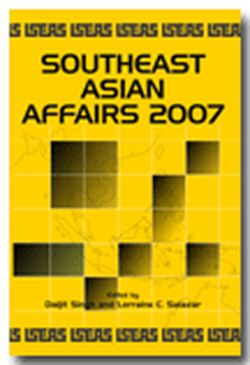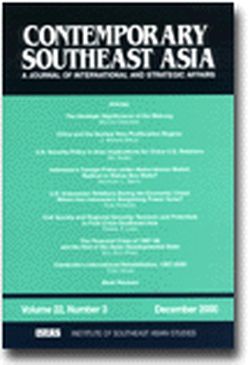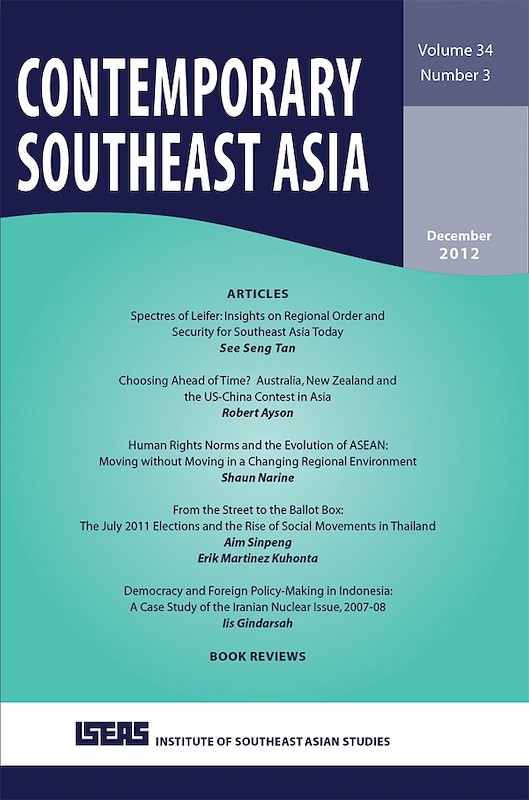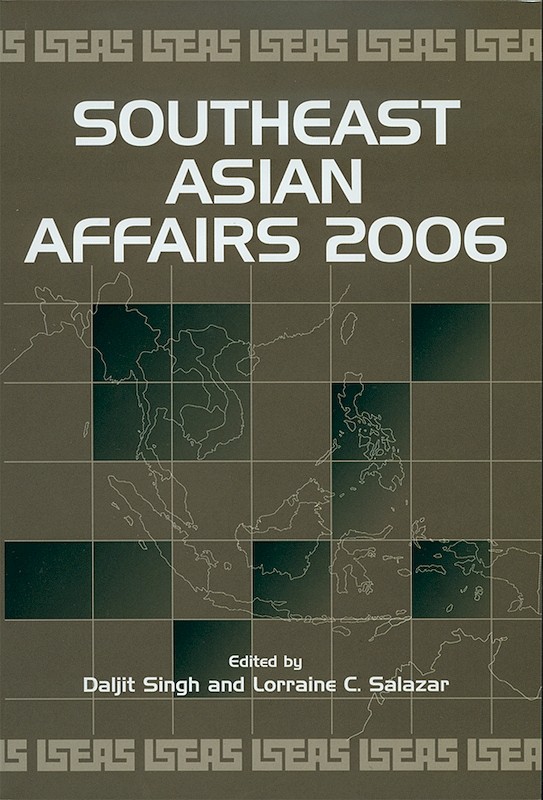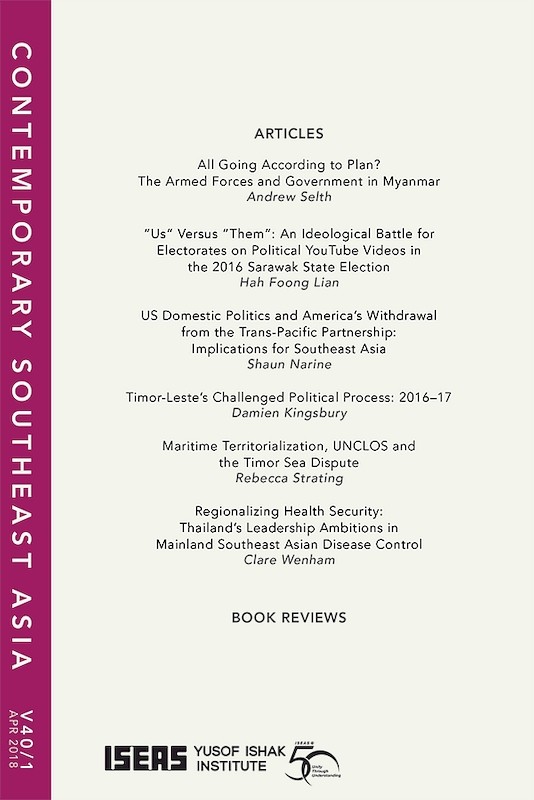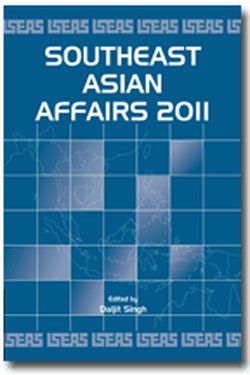Contemporary Southeast Asia Vol. 34/2 (Aug 2012)
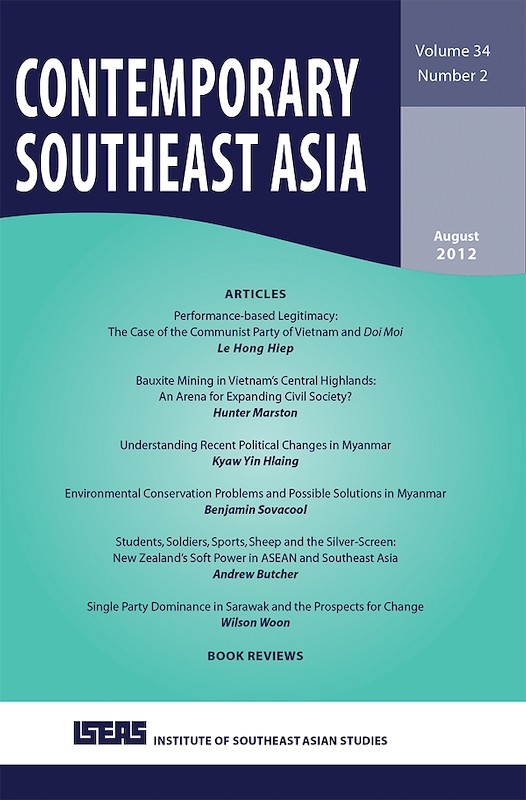
Date of publication:
August 2012
Publisher:
Institute of Southeast Asian Studies
Number of pages:
164
Code:
CS34/2
Contents
-
Contemporary Southeast Asia Vol. 34/2 (Aug 2012)
[Whole Publication] -
Preliminary pages
- ARTICLES
-
Performance-based Legitimacy: The Case of the Communist Party of Vietnam and Doi Moi, by Le Hong Hiep, author see abstractThis article examines the link between the legitimation process of the Communist Party of Vietnam (CPV) and its adoption of the Doi Moi (renovation) policy. It argues that socio-economic performance emerged as the single most important source of legitimacy for the CPV in the mid-1980s as its traditional sources of legitimacy were exhausted and alternative legitimation modes were largely irrelevant or ineffective. The CPVs switch to performance-based legitimacy has had significant implications for Vietnams domestic politics as well as its foreign policy and has served as an essential foundation for the Partys continued rule. At the same time, however, it has also presented the CPV with serious challenges in maintaining uninterrupted socio-economic development in the context of the countrys growing integration with the global economic system which is experiencing instability. It is in this context that nationalism, couched in terms of Vietnams territorial and maritime boundary claims in the South China Sea, has been revived as an additional source of legitimacy in times of economic difficulties.
-
Bauxite Mining in Vietnam's Central Highlands: An Arena for Expanding Civil Society?, by Hunter Marston, author see abstractThis paper examines the status of contemporary civil society in Vietnam from a process-oriented perspective. It considers civil society in light of its actions and processes rather than by its political and structural affiliations. The analysis takes as a case study the bauxite mines in the Central Highlands. The Chinese-Vietnamese joint venture between two respective state-owned enterprises (SOEs) is seeking $15 billion in investment by 2025 to take advantage of Vietnams huge bauxite reserves in order to process aluminum. The project has fomented unprecendented criticism from individuals within the mainstream elite of the Party, as well as environmental scientists, prominent lawyers and citizen bloggers in Vietnam. After a series of contentious policy debates and high-level reviews by various government ministries concerning the projects sustainability, environmental as well as social impact, the Vietnamese government approved and initiated mining in early 2012. By looking at the various sites of contention, National Assembly debates, and public outcry concerning the case, this paper advances a new conceptual framework for analysing civil society in Vietnam. The bauxite controversy explictly showcases the form that civil society is taking in contemporary Vietnam. I will argue that interactions among the vacillating civil society network that encompasses both grassroots activists and reformist political leaders will guide elite-level policy in Vietnam in such a way that does not pose a direct challenge to the Partys central authority.
-
Understanding Recent Political Changes in Myanmar, by Kyaw Yin Hlaing, author see abstractSince the new government took power in 2011, the citizens of Myanmar have enjoyed a greater degree of freedom than at any time since the military seized power in 1962. This article explains how the recent political changes in Myanmar have come about. In so doing, it argues that the absence of a rigid paramount leader who opposes reconciliation with the opposition leader Aung San Suu Kyi, the challenges posed by serious economic problems and positive responses from Western countries and pro-democracy leaders in Myanmar have allowed liberals in the government to work together for the further liberalization of the countrys political system. However, Myanmar still has a long way to go before it can become a full-fledged democracy. There still are hardliners in both camps who are unsatisfied with the pace of reforms: hardliners in the government think that the pace of reform is too fast while hardliners in the pro-democracy movement feel that they are too slow. Both groups could still generate instability in the country, prompting a military coup. Myanmar is at the crossroads and the cooperation between all sections of society will allow the country to become a full-fledged democracy.
-
Environmental Conservation Problems and Possible Solutions in Myanmar, by Benjamin K Sovacool, author see abstractThis article explores what the academic literature tells us about environmental conservation challenges in Myanmar, and what types of domestic and international mechanisms are suited to address those challenges. It begins by providing background information on rural energy use, environmental legislation, forestry, agriculture and the countrys network of protected areas. It notes, for example, that the countrys protected areas face environmental degradation caused by poverty, corruption, the expansion of agricultural land and population growth. It goes on to argue that planners in Myanmar can, however, utilize a variety of mechanisms to overcome these challenges. Policy-makers can enhance community involvement in protected areas and management schemes through ownership and engagement. They could integrate conservation efforts with income generation, provide education and awareness campaigns for those living near wildlife areas and expand the number and size of protected areas. They could, furthermore, increase penalties against illegal activities within protected areas, offer accelerated staff training and education programmes and similarly consolidate regulatory authority for environmental conservation. Even those outside of Myanmar can prevent environmental destruction. International planners could implement ecosystem payments schemes, involve Myanmar more concretely in the Reducing Emissions from Deforestation and Degradation (REDD) process, an international agreement launched in 2012, and expand Myanmars participation in the Convention on International Trade in Endangered Species of Wild Fauna and Flora. Lastly, they could advocate international bans on exports of illegal products and strengthen capacity building efforts in the areas of forestry, land use and agriculture.
-
Students, Soldiers, Sports, Sheep and the Silver-Screen: New Zealand's Soft Power in ASEAN and Southeast Asia, by Andrew Butcher, author see abstractAlthough New Zealand is a small state in the South Pacific, it has a great interest in the stability of Southeast Asia, the safety of sea lanes which pass through it and the centrality of ASEAN in the regional security architecture. However, New Zealand has limited hard power capabilities: the countrys military expenditure is extremely modest and its population and GDP are dwarfed by ASEAN as a region and by some Southeast Asian countries. What New Zealand potentially offers Southeast Asia, however, is its soft power. This article identifies five of New Zealands soft power assets - students, soldiers, sports, sheep and the silver-screen - and critically examines whether these constitute sufficient resources for New Zealand to engage with Southeast Asia adequately, and make a contribution to regional stability.
-
Single Party Dominance in Sarawak and the Prospects for Change, by Chris Wilson, author see abstractSarawak, formerly a British colony prior to the formation of Malaysia, has been ruled by the Barisan Nasional (BN) coalition for over four decades. Although the BNs political domination has been robust, it has never been smooth sailing, particularly in the 1960s and mid-1980s. The crises in the 1960s were resolved partly by the timely and swift interventions of the British and the core BN parties based in Peninsular Malaysia, albeit with resistance from local political parties. When a leadership crisis in the Sarawak BN erupted in mid-1980s, the coalition gained firm control over the state apparatus. This enabled the embattled Chief Minister to utilize the states resources to fend off opponents, rally the support of the electorate and subsequently retain control of the state. After more than two decades of relatively unchallenged rule, recent events such as the revolt of urban voters, the emergence of a strong opposition coalition and the impending resignation of Taib Mahmud - the most powerful figure in Sarawak and the longest serving Chief Minister in the country - have indicated that a change in political hegemony could be in the making. However, the most important factor that would bring about such a change, a revolt of rural voters, does not seem likely to happen in the near future.
- BOOK REVIEWS
-
BOOK REVIEW: Hard Interests, Soft Illusions: Southeast Asia and American Power. By Natasha Hamilton-Hart, by David Capie, author
-
BOOK REVIEW: The Institutional Imperative: The Politics of Equitable Development in Southeast Asia. By Erik Martinez Kuhonta, by Ben Thirkell-White, author
-
BOOK REVIEW: ASEAN: Sovereignty and Intervention in Southeast Asia. By Lee Jones, by Malcolm Cook, author
-
BOOK REVIEW: Water: Asia's New Battleground. By Brahma Chellaney, by Milton Osborne, author

